
THE STORY OF THE KING JAMES BIBLE
[caption id="GlorytoGodintheHighest_Feature" align="aligncenter" width="674"]
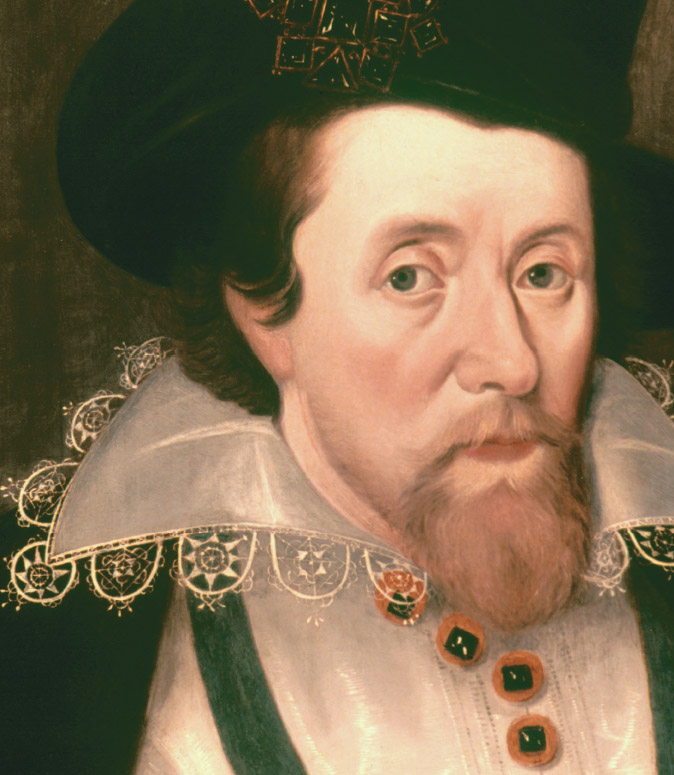
The Granger Collection, NY
FOR DECADES KINGS AND CLERICS RESISTED TRANSLATING THE BIBLE INTO THE ENGLISH LANGUAGE, BUT POPULAR DEMAND GREW INTO AN IRRESISTIBLE FORCE THAT LED DRAMATICALLY TO THE CREATION OF THE GREATEST MASTERPIECE OF ENGLISH PROSE OUTSIDE THE SHAK E S P EAR EAN CANON.
[caption id="GlorytoGodintheHighest_img1" align="aligncenter" width="411"]
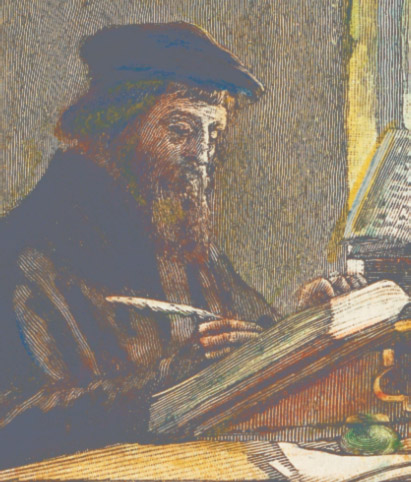
The Granger Collection, NY
[caption id="GlorytoGodintheHighest_img2" align="aligncenter" width="978"]
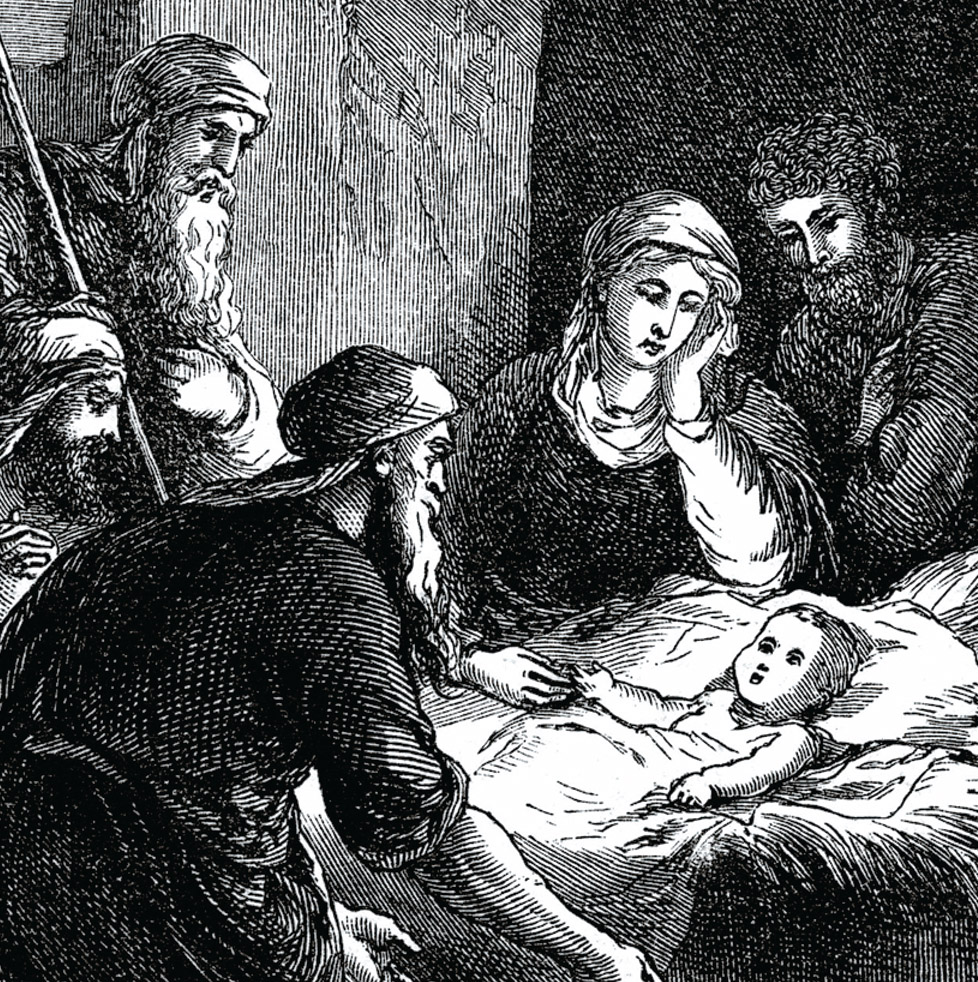
The Granger Collection, NY
AND THERE WERE IN THE SAME COUNTRY shepherds abiding in the field, keeping watch over their flock by night. And, lo, the angel of the Lord came upon them, and the glory of the Lord shone round about them: and they were sore afraid.
And the angel said unto them, Fear not: for, behold, I bring you good tidings of great joy, which shall be to all people. For unto you is born this day in the city of David a Saviour, which is Christ the Lord. And this shall be a sign unto you; Ye shall ®nd the babe wrapped in swaddling clothes, lying in a manger.
And suddenly there was with the angel a multitude of the heavenly host praising God, and saying, Glory to God in the highest, and on earth peace, good will toward men.
Whether you celebrate the holidays by attending church services or sitting in front of a television tuned to A Charlie Brown Christmas, you are most likely familiar with the stirring words of the Christmas story. They are a well-known and beloved affirmation of the reason for the season and a cultural heritage shared by English-speaking people throughout the world. In fact, without the King James Bible, from which this familiar translation is taken, the English language itself would be markedly different.
The origins of the modern English language lie in the tumultuous cross-cultural interaction between the 11th-century Anglo-Saxon population of Britain and the Norman French invaders who ruled them. As languages go, English was a latecomer. Neither the Hebrew scribes nor the Gospel writers could have imagined such a thing. Conversely, the languages of the Bible—Hebrew, Greek, Aramaic—were ancient mysteries to the subjects of William the Conqueror and their descendants. Even Latin, the speech of learned people throughout medieval Christendom, remained a dialect of the privileged few, so the Latin Vulgate translation, too, was incomprehensible to the masses.
For the common English Christian of the Middle Ages, the Holy Scriptures remained a light hidden under a bushel. Not everyone thought this a bad thing. The pearls of divine truth contained in the Scriptures, they reasoned, should not be tainted by being recast into the dialect of rude barbarians. The English language might be adequate to convey the essentials of pig farming, but surely it could not be entrusted with the task of communicating God’s Holy Word. What’s more, the priestly class had a vested interest in maintaining a monopoly on biblical literacy. By doing so, they perpetuated the laity’s dependence on the church hierarchy to interpret the Scriptures for them.
While the Church saw this as a high calling, it was not immune to political and aristocratic influences. Priestly concerns for their flocks’spiritual welfare went hand in hand with an expectation that their parishioners would maintain a certain spirit of subservience. Medieval kings and princes naturally felt the same desire. Bible verses such as Acts 4:19 (”Peter and John answered and said unto them, Whether it be right in the sight of God to hearken unto [religious leaders] more than unto God, judge ye“) were seen as enormously dangerous because they established a biblical precedent for defying political and ecclesiastical authority.
All in all, 15th-century kings and bishops thought such messages needed to be handled with the utmost care lest they become ammunition for the disenfranchised. Revolutions had been sparked by such ideas, and most of those in power felt no great desire to have such verses translated from cryptic ancient tongues into the vernacular.
Nevertheless, one man made the attempt. As early as the late 14th century, John Wycliffe composed an English Bible, and suffered dearly for it by losing his position at Oxford University. While Wycliffe’s translation was groundbreaking, and laid a foundation for others to build on, the time was not yet right for such things to gain general acceptance. Rather than spark a trend, Wycliffe’s ideas prompted ruthless suppression. Half a century after his death, he was not eulogized for his life’s work; rather his bones were unearthed and burned. It remained for others to take up the cause.
Nearly two centuries passed before Martin Luther’s Reformation again questioned the established Church’s handling of doctrine, ritual and biblical interpretation. Luther, in the spirit of Wycliffe, produced a German translation of the Bible. As the Reformation began sweeping the Continent, the emergence of a relatively well-educated merchant class in England created a potentially large audience capable of reading an English translation, and the laity grew increasingly curious to see for themselves what the ancient authors had to say.
AS THE REFORMATION BEGAN SWEEPING THE CONTINENT, THE EMERGENCE OF A RELATIVELY WELL-EDUCATED MERCHANT CLASS IN ENGLAND CREATED A POTENTIALLY LARGE AUDIENCE CAPABLE OF READING AN ENGLISH TRANSLATION, AND THE LAITY GREW INCREASINGLY CURIOUS TO SEE FOR THEMSELVES WHAT THE ANCIENT AUTHORS HAD TO SAY.
[caption id="GlorytoGodintheHighest_img3" align="aligncenter" width="424"]
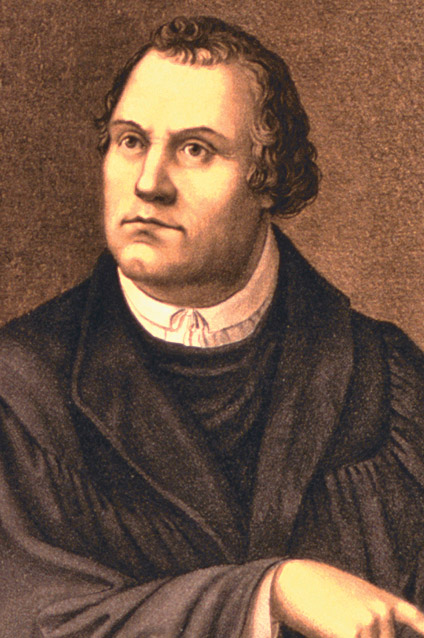
The Granger Collection, NY
The next English Bible to appear amid the uproar caused by Luther’s Reformation sprang from the pen of William Tyndale. Copies began to circulate in England in 1526 and would eventually have a profound impact on the creation of the King James Version in 1611. Much of the phraseology Tyndale introduced in his translation has since emerged into everyday speech: “my brother’s keeper,”
“salt of the earth” and “the powers that be,” as well as “Jehovah” as the common transliteration of the name of the God of the Hebrews.
King Henry VIII, however, did not receive Tyndale’s New Testament gladly. In fact, Henry effectively declared war on it. The king’s ministers ordered that all copies of the “untrue” translation be burned. Tyndale himself fared no better. Turned over to English authorities, he was strangled and then burned at the stake, demonstrating what a dangerous vocation biblical translation could be. Still, the popularity of Tyndale’s Bible among the people made both church and state take notice. While they were not prepared to accept freelance efforts at biblical translation, the church and the crown at least began to recognize the need for an acceptable English-language version of the Scriptures.
Then, as if on cue, Henry VIII’s break with the Roman Church, resulting from the pope’s refusal to allow the annulment of the king’s marriage to Catherine of Aragon, produced a fundamental change in the political and religious climate in England. Acquiescing somewhat to the growing appeal for an English Bible—not the least by his new queen, Anne Boleyn—Henry tacitly accepted an English Bible produced by Miles Coverdale, which borrowed heavily from the earlier “heretical” efforts of William Tyndale. Suddenly, the English language was both politically and religiously correct.
Had Anne borne a son and thus remained in Henry’s good graces, Coverdale’s translation might have become the first authorized English Bible, and the one we all quote from on Christmas Eve. But in 1536 Henry ordered Anne’s execution on trumped-up charges of adultery. Thereafter, all traces of the Protestant queen, including her favorite Bible, were purged from Henry VIII’s court.
Religious divisions within England in the turbulent years following King Henry’s death made the road to an authorized English translation of the Bible a bumpy one. Any translation that too obviously favored either the Catholic or the Protestant interpretation was unlikely to be universally accepted. Even if authorized by the reigning monarch, a new translation would probably be scotched by any successor whose sympathies lay with the competing faction.
Henry was succeeded first by his Protestant son, Edward VI, then by the fiercely Catholic Queen Mary, next by the conciliatory Elizabeth and ultimately by the Presbyterian James I (James VI of Scotland). Following Henry’s defiance of Rome and Mary’s bloody suppression of Protestantism, Elizabeth’s policy of religious tolerance might have been expected to be universally welcomed, but England’s Christian community was not so easily satisfied. During the near halfcentury of Elizabeth’s rule, Puritanism began to exert a greater influence in the realm. To the Puritan faithful, compromise was unacceptable and Elizabeth’s middle-of-the-road policy, designed above all to maintain political stability, was unacceptably soft.
[caption id="GlorytoGodintheHighest_img4" align="aligncenter" width="1024"]
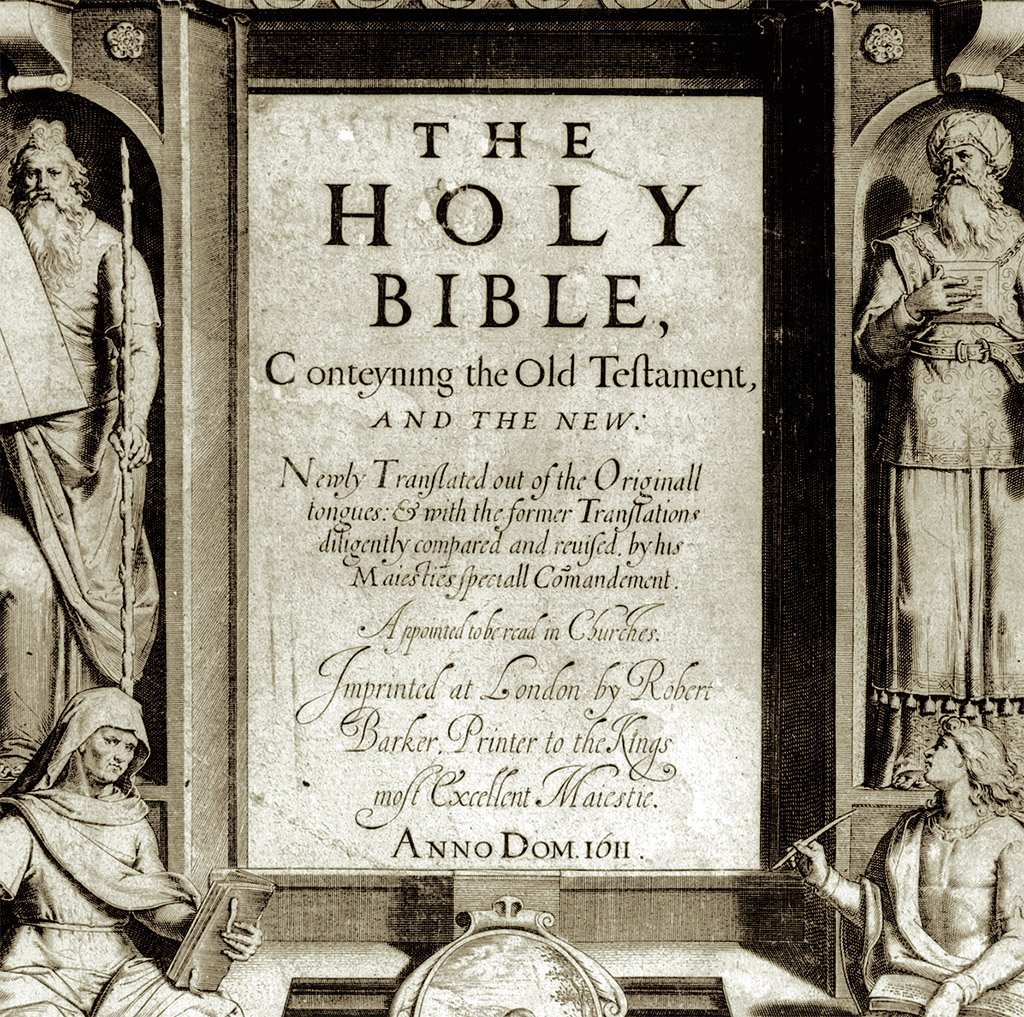
The Granger Collection, NY
[caption id="GlorytoGodintheHighest_img5" align="aligncenter" width="860"]
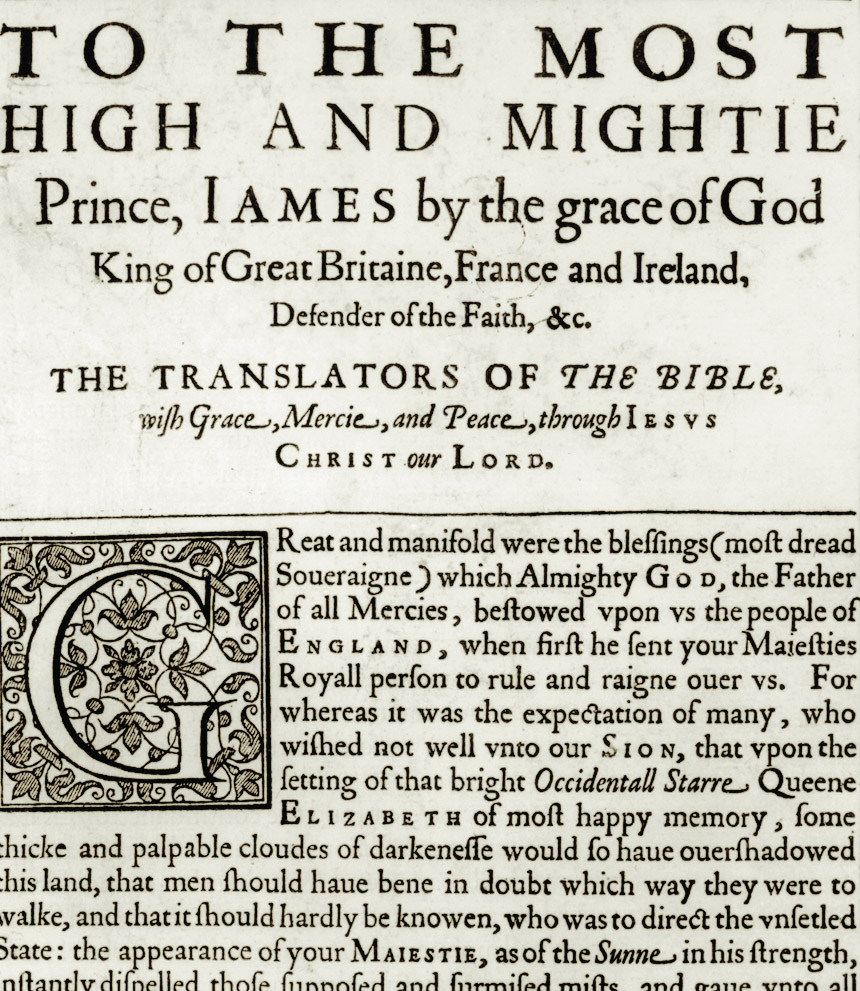
The Granger Collection, NY
Puritans looked ahead to the accession of King James as a promising opportunity to put England’s religious priorities back in order by welcoming an ally to the throne. James, who had ruled Scotland since 1567, was unapologetically Protestant. England, though, was not Scotland. James’outwardly “puritanical” leanings in Scotland were, in fact, a concession to that country’s strongly entrenched Calvinistic brand of Protestantism. Once in England himself, where Puritans did not yet hold a monopoly on political power, James’ inherent dislike of Puritanism had freer rein.
Still, James I had a difficult road to follow. In Scotland, he had had to please only one strong faction. In England, he quickly perceived the need to appease the same competing factions that had shaped Elizabeth’s policies—the Anglican hierarchy and the stricter Puritans. Shortly after arriving in England, James declared that he would convene a conference at Hampton Court Palace to hear both parties air their grievances. The announcement gave great hope to the Puritans, but at the 1604 conference, they won no substantial concessions from the unexpectedly stubborn new king. James vetoed their request that the Geneva Bible, published on the Continent, be adopted as the standard text in England. By way of throwing them a small face-saving concession, though, he offered to commission an entirely new translation.
This offer did not exactly thrill the Puritans, but the king nonetheless made a substantial commitment to see it through. In contrast to the solo efforts of Tyndale and Coverdale, James appointed six teams of about nine translators each and gave each a distinct portion of the Bible to study and translate. The text they produced has been recognized, along with the works of William Shakespeare, as a pivotal event in the development of the English language and England’s primary contribution to the Renaissance. The resultant translation, called the King James Version (KJV), relied on the relatively highbrow London dialect, established the norms of written English and helped squelch other spoken dialects. On the other hand, it helped give longer life to word forms that were already dying out prior to its publication, such as the personal pronouns “thee” and “thou” and the verb ending “-eth” (for example, “walketh” rather than “walks”).
Named the “Authorized Version” of the Bible in England, the KJV was a translation of marked eloquence. Eloquence was not, however, a primary purpose of the translators. They were interested in accuracy. Ironically, the translators found that they needed to borrow heavily from other languages in order to render the Bible into English. Many ancient Hebrew and Greek words had no English equivalent—&lduqo;crucifixion,” “parable,” “apostle.” So while about 93 percent of the words in the King James Version were of Anglo-Saxon origin, the rest were “foreignº—mostly Latin—and first entered the English language in this way.
Likewise, the ancient languages included many figures of speech that would have sounded strange to 17th-century readers. For the most part, the translators rendered these expressions literally, rather than paraphrasing them. Over time, they found their way into common usage. Thus the King James Version introduced English speakers to such colorful phrases as “putting words in someone’s mouth,” “the skin of my teeth,” “from time to time,” “sour grapes” and “rise and shine.”
In the end, James’scholars created a translation that was a literary achievement in its own right. Interestingly, the beautifully poetic language of the King James Version, which many people today consider to be its most endearing quality, may, from a purely linguistic perspective, be its least satisfactory feature. In producing a Bible with great artistic merit, in the style of Homer’s Iliad, teams of translators consciously transformed the often unpolished, earthy prose of the 1st-century
THE KING JAMES BIBLE CHRISTMAS STORY LUKE 2: 1-20
And it came to pass in those days, that there went out a decree from Caesar Augustus, that all the world should be taxed.
(And this taxing was first made when Cyrenius was governor of Syria.)
And all went to be taxed, every one into his own city.
And Joseph also went up from Galilee, out of the city of Nazareth, into Judaea, unto the city of David, which is called Bethlehem; (because he was of the house and lineage of David:) To be taxed with Mary his espoused wife, being great with child.
And so it was, that, while they were there, the days were accomplished that she should be delivered.
And she brought forth her firstborn son, and wrapped him in swaddling clothes, and laid him in a manger; because there was no room for them in the inn.
And there were in the same country shepherds abiding in the field, keeping watch over their flock by night.
And, lo, the angel of the Lord came upon them, and the glory of the Lord shone round about them: and they were sore afraid.
And the angel said unto them, Fear not: for, behold, I bring you good tidings of great joy, which shall be to all people.
For unto you is born this day in the city of David a Saviour, which is Christ the Lord.
And this shall be a sign unto you; Ye shall find the babe wrapped in swaddling clothes, lying in a manger.
And suddenly there was with the angel a multitude of the heavenly host praising God, and saying,
Glory to God in the highest, and on earth peace, good will toward men.
And it came to pass, as the angels were gone away from them into heaven, the shepherds said one to another, Let us now go even unto Bethlehem, and see this thing which is come to pass, which the Lord hath made known unto us.
And they came with haste, and found Mary, and Joseph, and the babe lying in a manger.
And when they had seen it, they made known abroad the saying which was told them concerning this child.
And all they that heard it wondered at those things which were told them by the shepherds.
But Mary kept all these things, and pondered them in her heart.
And the shepherds returned, glorifying and praising God for all the things that they had heard and seen, as it was told unto them.
[caption id="GlorytoGodintheHighest_img6" align="aligncenter" width="880"]
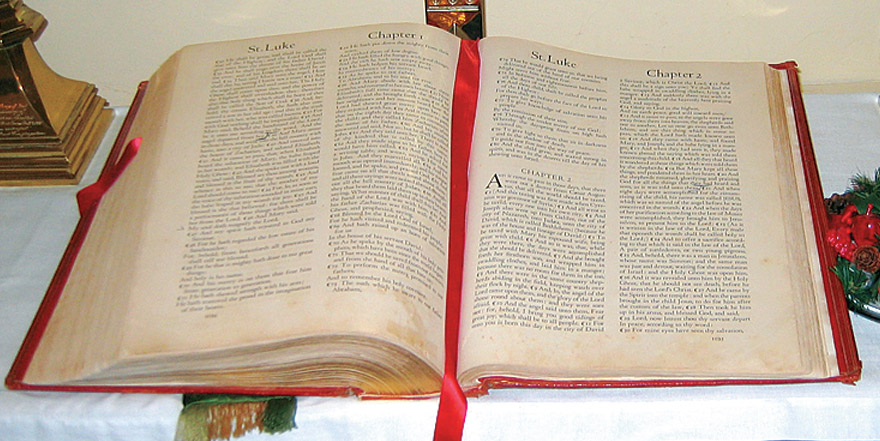
The Granger Collection, NY
[caption id="GlorytoGodintheHighest_img7" align="aligncenter" width="672"]
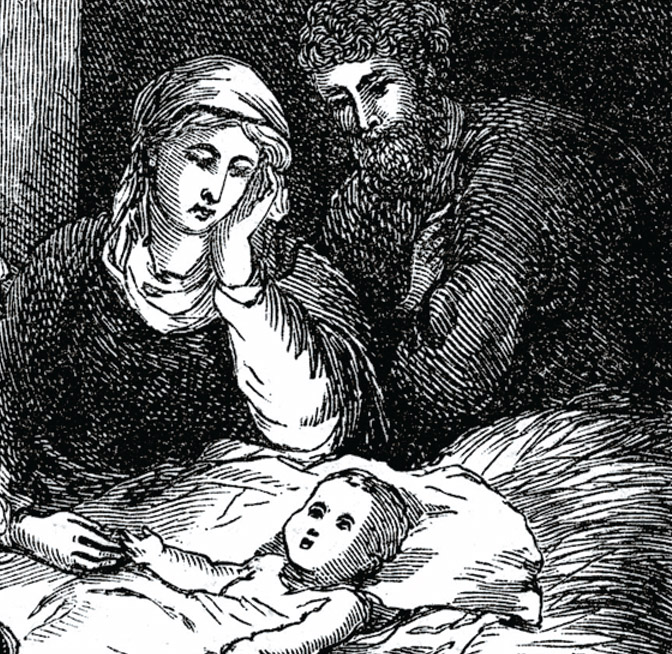
The Granger Collection, NY
THE INFLUENCE THE KING JAMES BIBLE HAS HAD IN THE 400 YEARS SINCE ITS PUBLICATION IS INESTIMABLE.
Greek into the lace-collar English of Elizabethan and Stuart courtiers and scholars.
At the same time that they gave the prose portions of the Bible an elegance the original text did not necessarily share, the translators rendered its poetic passages, notably the Psalms, into English prose. Thus while the King James Version is luscious, it does not reproduce the literary styles employed by the original authors with complete fidelity.
The influence the King James Bible has had in the 400 years since its publication is inestimable. Initially, though, the Authorized Version proved to be only the second-favorite translation in England. The 50-year-old, officially discredited Geneva Bible held the hearts of most common English readers. Remarkably, even James’own translators, in writing an introduction to the new Bible, quoted from the Geneva Bible rather than citing their own version.
Under King James, publication of the Geneva Bible was prohibited in England, but he did not interfere with its importation. As sales of the earlier, and cheaper, translation continued to greatly outpace the Authorized Version, William Laud, archbishop of Canterbury, suggested that importation, too, ought to be banned. “Would any man buy a worse Bible dearer, that might have a better more cheap?” he asked. By describing the Geneva Bible as the “better” of the two, Laud meant the quality of the binding and typography, which was superior to anything English printers had yet achieved; but in the opinion of many in England, his description was equally applicable to the quality of the translation.
[caption id="GlorytoGodintheHighest_img8" align="aligncenter" width="1024"]
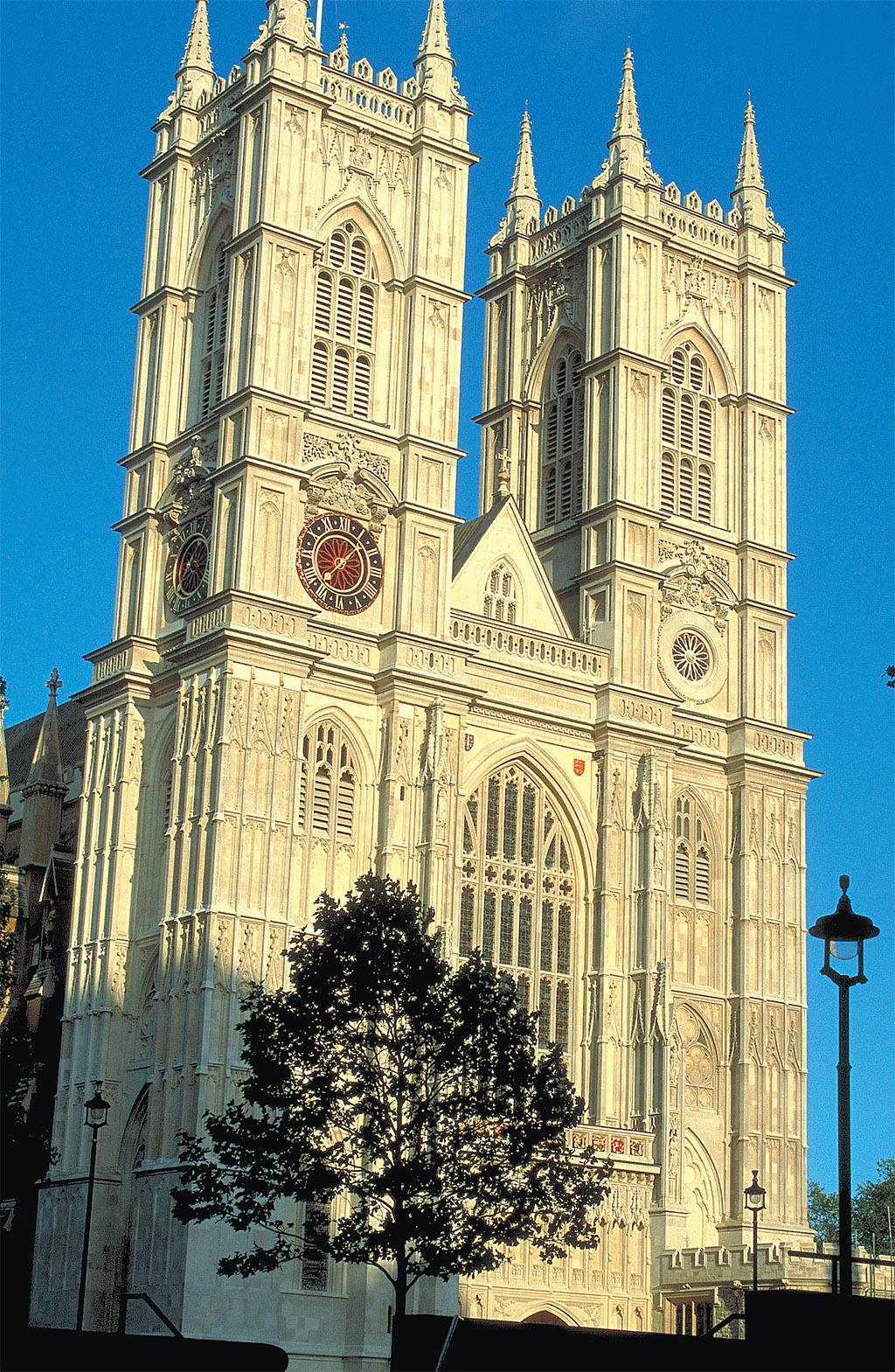
The Granger Collection, NY
Puritans found the Authorized Version not to their liking, and thus the prospects for long-term success of the KJV hit a low point with the outbreak of the English Civil War, which pitted King Charles I against Parliament and, in effect, the Anglican Church against the Puritans. Furthermore, a Parliamentarian victory threatened to put an end to widespread use of the Bible that had been favored by the Royalist faction.
Talk began of revising the King James Bible in order to produce a version authorized not by the overthrown monarchy but by Parliament. In the event, the shortlived republic headed by the Puritan Lord Protector, Oliver Cromwell, proved so repressive and unpopular—enforcing such ill-advised policies as the banning of Christmas celebrations—that upon Cromwell’s death, the pendulum of public opinion swung decisively back in the other direction. The monarchy was restored, and with it, the King James Bible came to be seen as a refreshing symbol of the good old days before England’s dreary experiment with republicanism.
In the decades that followed, the King James Bible attained unparalleled prestige. When English colonists carried British culture to North America, Australia and Asia, the Authorized Version went with them. In time, memory of all the versions that had preceded it, and to which its creators had acknowledged a debt, were forgotten, and the mere suggestion that further revisions might be in order was tantamount to heresy. Such is the impact that this most honored of all Bible translations has achieved.





Comments